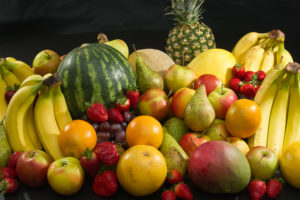 Increasing fruit and fruit juice consumption during pregnancy leads to better cognitive development in babies? New research found that six or seven servings of fruit or fruit juice a day prenatally was associated with 6 or 7 points higher IQ at one year of age. Interestingly, fruit flies show a similar effect. But postnatal (after birth) fruit intake did not enhance cognitive outcomes in human babies or Drosophila fruit flies. But now, will these results in the babies hold up over time?
Increasing fruit and fruit juice consumption during pregnancy leads to better cognitive development in babies? New research found that six or seven servings of fruit or fruit juice a day prenatally was associated with 6 or 7 points higher IQ at one year of age. Interestingly, fruit flies show a similar effect. But postnatal (after birth) fruit intake did not enhance cognitive outcomes in human babies or Drosophila fruit flies. But now, will these results in the babies hold up over time?
The US Department of Agriculture (USDA) and US Department of Health and Human Services recommend 2 cups (3–4 servings) of fruit per day for active women. One cup of fruit (2 servings) consists of either 1 cup of raw or cooked fruit, 1 cup (8 oz) of 100% fruit juice, or a small whole fruit. Note that the results of the study support an increased consumption of fruit to 6–7 servings or 3 cups per day for pregnant women.From Science Daily:
Prenatal fruit consumption boosts babies' cognitive development
The benefits of eating fruit can begin as early as in the womb....The study, published in the journal EbioMedicine, found that mothers who consumed more fruit during pregnancy gave birth to children who performed better on developmental testing at one year of age. Piush Mandhane, senior author of the paper and associate professor of pediatrics at the University of Alberta's Faculty of Medicine & Dentistry, made the discovery using data from the Canadian Healthy Infant Longitudinal Development (CHILD) Study--a nationwide birth cohort study involving over 3,500 Canadian infants and their families.
"We wanted to know if we could identify what factors affect cognitive development," Mandhane explains. "We found that one of the biggest predictors of cognitive development was how much fruit moms consumed during pregnancy. The more fruit moms had, the higher their child's cognitive development."
The study examined data from 688 Edmonton children, and controlled for factors that would normally affect a child's learning and development such as family income, paternal and maternal education, and the gestational age of the child. Using a traditional IQ scale as a model, the average IQ is 100 and the standard deviation is 15; two thirds of the population will fall between 85 and 115. Mandhane's study showed that if pregnant mothers ate six or seven servings of fruit or fruit juice a day, on average their infants placed six or seven points higher on the scale at one year of age.
To further build on the research, Mandhane teamed with Francois Bolduc, an associate professor in the Faculty of Medicine & Dentistry's Division of Pediatric Neurology, who researches the genetic basis of cognition in humans and fruit flies....."Flies are very different from humans but, surprisingly, they have 85 per cent of the genes involved in human brain function, making them a great model to study the genetics of memory," says Bolduc....In a subsequent series of experiments, he showed that flies born after being fed increased prenatal fruit juice had significantly better memory ability, similar to the results shown by Mandhane with one-year-old infants. He believes it suggests that brain function affected by fruit and the mechanisms involved have been maintained through evolution, and conserved across species.

 Take note: all of us are exposed to these contaminants because they are in our environment. The Inuit exposure is just more concentrated. From Feb. 7, 2014 Environmental Health News:
Take note: all of us are exposed to these contaminants because they are in our environment. The Inuit exposure is just more concentrated. From Feb. 7, 2014 Environmental Health News: